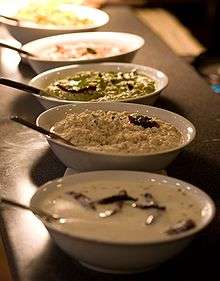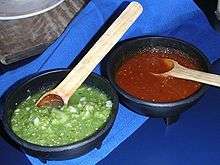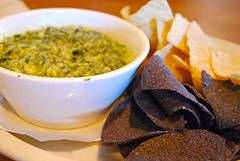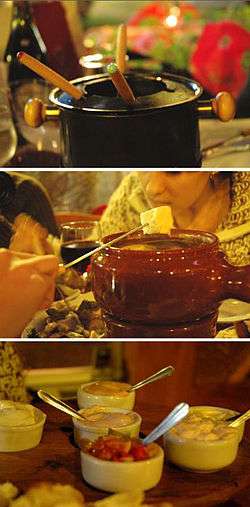Dipping sauce
|
A fondue bourguignonne | |
| Alternative names | Dipping sauce |
|---|---|
| Type | Condiment |
|
| |
A dip or dipping sauce is a common condiment for many types of food. Dips are used to add flavor or texture to a food, such as pita bread, dumplings, crackers, cut-up raw vegetables, fruits, seafood, cubed pieces of meat and cheese, potato chips, tortilla chips, and falafel. Unlike other sauces, instead of applying the sauce to the food, the food is typically put, dipped, or added into the dipping sauce (hence the name).
Dips are commonly used for finger foods, appetizers, and other easily held foods. Thick dips based on sour cream, crème fraiche, milk, yogurt, mayonnaise, soft cheese, or beans are a staple of American hors d'oeuvres and are thinner than spreads which can be thinned to make dips.[1] Alton Brown suggests that a dip is defined based on its ability to "maintain contact with its transport mechanism over three feet of white carpet".[2]
Dips in various forms are eaten all over the world and people have been using sauces for dipping for thousands of years.[3]
List of common dips




Some types of dip include:
- Aioli, a mayonnaise flavored with garlic.
- Ajika, a spicy, subtly flavoured dip in Caucasian cuisine, based on hot red pepper, garlic, herbs and spices.
- Ajvar, made from red bell peppers with garlic, found in Serbian cuisine
- Artichoke dip, uses artichoke as a primary ingredient. Some versions are served chunky, while others are puréed and have a smooth texture
- Baba ghanoush, a dip made from eggplant. It is popular in the Eastern Mediterranean and parts of South Asia.
- Bagna càuda, a regional dish of the Italian Piedmont; it is composed of garlic, anchovies, oil and dairy, and is served with assorted vegetables for dipping.[4]
- Barbecue sauce, a common sauce either tomato, vinegar, or mustard based, often used for grilled and fried meats, and french fries in the United States.
- Bean dip, dip made from refried beans
- Blue cheese dressing is usually made from mayonnaise, sour cream, yogurt, blue cheese, milk, vinegar, onion powder, dry mustard, and garlic powder. It is commonly used as a dip for raw vegetables or buffalo wings.
- Buffalo sauce, made from vinegar-based pepper (usually cayenne) hot sauce, is often used as both a coating for buffalo wings as well as a standalone dipping sauce for other foods.
- Chile con queso, a dip of melted cheese and chili peppers used in Tex Mex cuisine with tortilla chips.[5]
- Chili oil is used as a dipping sauce for meat and dim sum.
- Chocolate, a dip for various fruits, doughnuts, profiteroles and marshmallows.
- Chutney, any of a wide variety of sauces with origins in the sub-continent of India, from freshly chopped herbs in yogurt, to bottled, spiced fruit mixtures. Used with snacks like deep fried samosas and pakoras. In India and Sri Lanka, it is also commonly served with dosa and idli.
- Clam dip, a kind of condiment for dipping crackers and chips.
- Cocktail sauce, a popular dip for seafood made from ketchup or chili sauce and horseradish.
- Crab dip, a thick dip popular in Maryland usually made from cream cheese and lump crab meat.
- Fish sauce (Garum), or nam pla, the fermented fish equivalent of soy sauce, used in southeastern Asian cuisines as a dip for snacks and other foods.
- Fish paste or bagoong, fermented fish paste, used in southeastern Asian cuisines as a dip for rice dishes.
- Fondue, a melted cheese sauce, which rose in popularity in the U.S. and Europe during the 1960s and 1970s.
- French onion dip, a combination of sour cream, minced onions and onion salt.
- Fruit dip, a dip made from fresh fruit.
- Fry sauce, a dip made from ketchup and mayonnaise, eaten with french fries and onion rings.
- Garlic butter sauce, a dip made of garlic and melted butter, used for dipping seafood, chicken, beef and pizza. Plain clarified butter or drawn butter are more common with lobster, crab or clams.
- Gravy, a thickened sauce made from the natural juices given off during cooking. Used as a dipping sauce for bread, such as in Maghreb cuisine.
- Guacamole, a Mexican dip of avocados, onions and chili peppers, commonly eaten with tortilla chips; it may also be served as a salad.
- Hazelnut butter or hazelnut spread is commonly used as both a spread and a dip for crackers and cookies.
- Honey, a common dip for french fries and chicken.
- Hot sauce or chili sauce, a spicy dip made from peppers.
- Hummus, a Levantine dip of ground chickpeas and sesame tahini with spices and lemon juice.
- Jus, a broth formed with the natural juices given off by the food being cooked, such as is served with a French dip.
- Ketchup (also called catsup or tomato sauce), often used with french fries, onion rings, and a wide variety of other foods.
- Marinara sauce, a tomato sauce served with breadsticks, pizza, etc.
- Mayonnaise, the European egg and oil emulsion that is not only the basis for many dips, but is on its own a dip for cold chicken; raw, fried, and grilled vegetables; french fries; and seafood.
- Muhammara, a Near Eastern hot pepper and walnut dip.
- Mustard, ground seeds of the mustard plant; variants are used in Asian cuisine.
- Nacho cheese dip is a common party and sport condiment popular for dipping tortilla chips or for spreading on full tortillas.
- Nam chim are Thai dipping sauces which most often contain chili peppers.
- Nam phrik are Thai chili pastes which are also used as dips for vegetables and, for instance, fried fish.
- Nước chấm (Vietnamese) and Prik Nam Pla (Thai), mixes of chili peppers and fish sauce.
- Olive oil dip, pure or combined with different culinary herbs used for dipping fresh bread, a common dip in Greece and parts of Italy and Portugal.
- Ranch dressing is a condiment made of buttermilk, sour cream, yogurt, mayonnaise, minced green onion, garlic powder, and other seasonings mixed into a sauce.
- Romesco, a Catalan nut and red pepper-based sauce used as a dip or as a condiment for other dishes.
- Salsa, a fresh or bottled sauce based on tomato, with various chilis, onions, and herbs. Used most often with tortilla chips.
- Satsivi, a walnut dip in Georgian cuisine.
- Shrimp dip commonly used with vegetables and chips.
- Smetana, a type of sour cream, a common dip for bliny, pelmeni, vareniki.
- Sour cream, on its own or combined with mayonnaise and/or other ingredients, a common dip for potato chips.
- Soy sauce, the fermented bean liquid often served in small saucers for dipping a variety of East Asian foods. For sushi and sashimi, prepared wasabi is mixed in.[6]
- Spinach dip, for tortilla chips and vegetables, popular in the United States and Canada.
- Sriracha sauce, a spicy Thai or Vietnamese chili sauce made from chili peppers, salt, and distilled vinegar.
- Sweet and sour sauce, aka plum sauce or duck sauce, a semi-east-Asian chutney, used for dipping fried noodles, dumplings, and other snack foods.
- Taramosalata, a Near Eastern dip of carp or codfish roe.
- Tartar sauce, commonly used with seafood, a mixture of mayonnaise, capers or pickles, and spices.
- Tentsuyu, a Japanese dipping sauce.
- Tkemali, a cherry plum sauce in Georgian cuisine.
- Toyo & Kalamansi, a portmanteau of the Filipino words for soy sauce (toyo) and calamondin (calamansi). Used both for fried fish, fried tofu and pork, on porridge, among others.
- Tzatziki, a Greek condiment made with yoghurt. Similar sauces used for dipping include tarator (Turkey, Serbia) and Raita (India).
- Vinegar, especially with crushed garlic, is used in the Philippines as a dip for grilled meats, and steamed crabs. Balsamic vinegar is also commonly used as a dipping sauce for bread.
- Vin Santo, into which cantucci (biscotti) are dipped.[7]
See also
References
- ↑ Rombauer, Irma S.; Becker, Marion Rombauer & Becker, Ethan (1997) [1931]. The Joy of Cooking. Illustrated by Laura Hartman Maestro (Rev. ed.). New York: Scribner. pp. 145–146. ISBN 0-684-81870-1.
- ↑ Alton Brown (writer/director/host) (2002-10-16). "Dip Madness". Good Eats. Season 6. Episode 9. Food Network.
- ↑ The Oxford Companion to American Food and Drink. p. 145.
- ↑ Hesser, Amanda (November 5, 2009). "Bagna Cauda, 1960". New York Times. p. MM20, New York edition. Retrieved March 8, 2010.
- ↑ Huntley Dent (November 23, 1993). Feast of Santa Fe: Cooking of the American Southwest. Simon and Schuster. pp. 148–150. ISBN 978-0-671-87302-8. Retrieved March 5, 2013.
- ↑ Snow, Jane (March 15, 2006), "Sushi: how to choose, order and eat it", The Island Packet, Knight Ridder, p. 3-C, retrieved July 6, 2010
- ↑ Virbila, S. Irene (October 1, 1989). "Fare of the country:Italy's Vin Santo: a sip of hospitality". New York Times. ISSN 0362-4331. Retrieved September 12, 2011.


